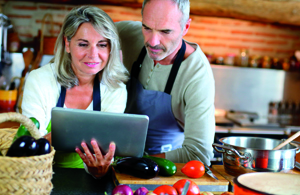Superfoods for seniors: Beyond the 'list'
5/23/2024 by Maria Mendoza De la Garza, M.D.

Blueberries! Acai berries! Salmon! They grab the headlines for being "superfoods" that will prolong life and fend off disease, along with a host of ailments associated with aging. What makes them "super" is that they're usually packed with nutrients.
Take blueberries. They're pretty tasty, make a great pie and are full of antioxidants, potassium and vitamin C, which can help reduce the risk of heart disease and inflammation. That does make them pretty super.
But blueberries, along with others on the superfoods top 10 list, aren't the only foods that are super for seniors. While they get all the hype, almost all other fruits, vegetables, lean meats, fish, eggs, dried beans and peas, whole grains and dairy products are just as beneficial. Research doesn't show any evidence that eating more of a certain food will make you healthier and doing so may keep you from getting the other nutrients you need.
Food, not supplements or vitamins, is the best way to get the nutrients you need as you age. Super eating for seniors means choosing a wide variety of foods, especially whole foods like fresh or frozen fruits and veggies, fresh or frozen cuts of meat or fish and dairy products.
Your plate should look like a rainbow — full of life and color. Here's a handy guide for what should be on your plate:
- One-half: Fruits and vegetables. Whether they made the superfood list or not, all fruits and vegetables help lower your risk of death, heart attack, stroke and some cancers. They also provide natural fiber, which is good for digestion. Put them on your plate at every meal.
- One-quarter: Grains. This category includes whole-wheat pasta, 100% whole-grain bread, brown rice and steel-cut oats. Grains not only help prevent diabetes, but if you have it, they can help control your blood sugar.
- One-quarter: A source of protein, which could be lean meat, fish, eggs or tofu. These are easy sources of high-quality protein that you still need for building muscle and a variety of body-maintenance functions.
- On the side: Water. As we age, we lose our sense of thirst. And water is a simple way to provide the fluid our bodies need for everything from blood pressure to keeping mentally sharp. Tip: Instead of a glass, fill a bottle with water so you can keep track of how much you're drinking. A couple of sips aren't enough!
About dairy and nondairy substitutes (soy, almond and other "milks"): Your body still needs 1,200 mg of calcium a day, along with vitamin D, to build and strengthen bones and prevent osteoporosis, especially in women.
- Healthy eating is doable, no matter your age. These tips can help you make it happen:
- Shop along the perimeter of your grocery store — not down the aisles — for most whole foods.
- Choose fresh fruits and veggies. If this isn't an option, go for frozen. They're flash-frozen, preserving the flavor and texture without added sodium or other preserving agents.
- Visit a farmers' market with family or friends. Not only will you have an excellent selection to choose from, but it's also a fun outing.
- Keep a bowl of fresh fruit for snacking on the table as a reminder. Fruit in the fridge might not get eaten.
- Use herbs, spices and other seasonings (not just salt!) to boost the flavor and aroma of foods to make them more appealing as our sense of taste dulls.
- Cook fruits and veggies a bit to make them softer and easier to chew and swallow. Bananas, grapes, berries, pears, tomatoes and dark leafy greens are just a few choices that can be eaten raw without the chewing challenge.
- Try smoothies. With a blender, veggies or fruits, milk and ice, you've got an easy breakfast or snack.
- White bread and rice will never be super. Go for the whole grain.
Is there room for treats and sweets? If you're generally in good health, you can say "yes" to occasional treats without feeling guilty. They will make your taste buds happy and add pleasure to your day.
Healthy eating of a wide variety of foods is one key to being a super senior. Enjoy!
Maria Mendoza De la Garza, M.D., is a geriatrician in Community Internal Medicine, Geriatrics and Palliative Care. She practices across the community in clinics, skilled nursing facilities and home-care-based settings.
